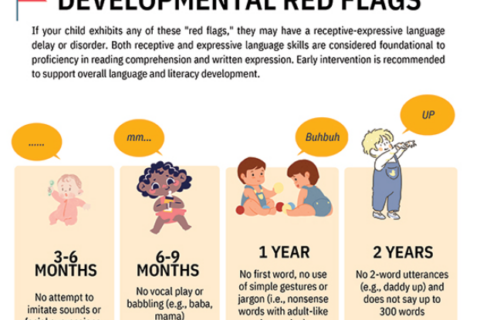Receptive vs. Expressive Language Disorders: What Is the Difference?
Language refers to our understanding of words and their meaning, as well as our use of language to communicate ideas and messages to others. Language can be written, spoken, or signed using hand, facial, and body gestures.
When an individual experiences delays, difficulties, or disruptions to their comprehension and/or communication, this is referred to as a language disorder. Language disorders may require temporary or ongoing support as they can impact a person’s ease of learning, understanding, speaking, and developing literacy skills. Everyone has the potential to strengthen and improve language skills.
Types of Language Disorders
Language disorders cover a range of issues that can affect both comprehension and expression. These disorders are generally divided into two categories: receptive or expressive language disorders.
Receptive language disorders affect the ability to understand and process verbal or written language. This leads to challenges in following instructions, understanding conversations, reading comprehension, or interpreting gestures.
Expressive language disorders involve difficulties in producing language, which can manifest as trouble speaking and expressing thoughts verbally or in writing. It can also affect vocabulary growth, grammar, or word retrieval.
Receptive language skills are considered foundational to expressive language. This is because, typically, a person must understand a word conceptually before they use it for communication. As a result, those who experience challenges in the area of receptive language often face challenges in language expression as well including vocabulary development, reading comprehension, and writing. For this reason, receptive language disorders are referred to as Mixed receptive-expressive language disorders due to challenges with both the comprehension and production of language.
Expressive Language Disorders
Expressive language disorders refer to difficulties in expressing oneself. Individuals living with an expressive language disorder have difficulty easily and efficiently communicating their needs, thoughts, or ideas using verbal or non-verbal means of communication.
The term encompasses a host of different communication skills ranging from using appropriate early pre-linguistic language such as body language (e.g., eye contact and pointing) to appropriately using cultural conventions of verbal and written language.
Challenges with verbal expression may include a limited vocabulary inventory, difficulty finding the right words to say when talking, or trouble using appropriate grammatical structures and sentence forms. It can also include difficulty organizing and sequencing ideas to share a clear and cohesive message when talking or writing.
What Causes a Language Disorder?
Both adults and children can experience language difficulties. When an expressive language disorder presents in childhood, it is usually associated with developmental factors. These may be symptoms related to a congenital syndrome such as Down syndrome, autism, or fragile X syndrome. Children living with hearing or visual differences may also require additional support to meet language milestones.
Language disorders may also arise independently because of specific weaknesses in language learning. These are considered developmental delays with unknown etiologies (causes). Language disorders are believed to have a genetic component as they tend to run in families.
While there is a vast range of language levels, all children can make significant gains given the right support that facilitates functional communication and rich connections with family and friends. Many children will reach language skills commensurate with their age-matched peers by adolescence and adulthood.
Receptive Language Disorders
Receptive language refers to listening, understanding, and interpreting spoken or written language. Receptive language disorders occur when people struggle with information they receive from others.
What are Common Symptoms of Expressive Disorders in Children?
While symptoms vary among individuals, individuals living with receptive language disorders may have difficulty:
- Understanding what people are saying to them
- Interpreting gestures people are using (e.g., nodding their head).
- Children may exhibit delays in their knowledge of age-appropriate vocabulary or concepts. Some individuals may struggle to:
- Follow directions,
- Identify or point to named objects
- Respond to questions.
In children, this can look like:
- A child not seem to pay attention when you’re talking to them,
- Not taking an interest in story books when read aloud,
- Having difficulty following verbal instructions
- Challenges understanding complicated sentences.
Both receptive and expressive language skills are inextricably intertwined in overall language and learning development. Children must first understand a word or concept’s meaning before they will say it or use it to communicate. Both receptive and expressive language skills are considered foundational to proficiency in reading comprehension and written expression. Therefore, and so early intervention is strongly recommended to support overall language and literacy development.
What are Common Symptoms of Receptive Language Disorders in Adults?
Adults with receptive language difficulties may struggle to follow conversations due to difficulties interpreting words and processing long streams of information. This can be further exacerbated by environmental distractions such as increased noise levels or distracting visual stimuli. Some adults may have a hard time carrying out tasks and directions and appear confused when asked to respond to questions.
What are Common Symptoms of Expressive Disorders in Children?
Children with expressive language disorders may exhibit differences from their age-matched peers related to the number and variety of vocabulary terms they use when speaking. Some children may have difficulty understanding the relationship between words or show frequent and prolonged searching for the right word.
Their language may contain immature or irregular grammatical mistakes and they may rely on simple sentence forms when speaking. Children with expressive language disorders may also demonstrate difficulty organizing and linking ideas to share information coherently in an efficient manner. As a result, they may make multiple reformulations of their stories or provide information in a confusing order.
What are Common Symptoms of Expressive Disorders in Adults?
Adults may acquire an expressive language disorder following a neurological event such as a stroke, brain tumor, traumatic brain injury, or progressive neurological condition. When an expressive language disorder is acquired in adulthood, it is referred to as aphasia.
Aphasia can impact an individual’s ability to speak, understand language, read, and/or write. People with aphasia may experience one or many of the described symptoms to varying degrees. For more information on aphasia, read our blogs on communicating with people with aphasia and how you can recover from aphasia.
Speech Therapy for Language Disorders at Open Lines®
If you notice differences or changes in your or your loved one’s language and communication that concern you, we recommend seeking the input of a licensed speech-language pathologist as soon as possible. You should find one who can perform a comprehensive language evaluation to determine whether language skills are tracking typically or whether intervention may be beneficial to enrich and strengthen skills. The sooner a person receives intervention, the faster they will make gains, and optimize their learning and growth.
At Open Lines®, every program begins with a one-to-one comprehensive evaluation with an expertly trained licensed speech-language pathologist. Your clinician will examine all aspects of language and communication. The results of this evaluation will help determine the specific areas of strength and those that may benefit from support to optimize life participation, and for children, overall learning acquisition and healthy development.
Our skilled speech-language pathologist will listen to your concerns and provide you with reliable and research-based advice about your or your loved one’s language strengths and challenges. Also, our team of compassionate clinicians will listen to your concerns and develop a personal plan of action that addresses your needs in consideration of your unique goals and life context. We will work with you and your care team to provide targeted strategies and evidenced-based interventions that will support your child’s development so they can thrive.
For more ideas on strategies parents can integrate into their daily communication and play routines, see our blog on developmental milestones.
For more information on specific adult language and communication treatments, see our blog on Is It Too Late for Speech Therapy? Can you return to work after a stroke? Can you recover from Aphasia? Cognitive Speech Therapy for Adults, Why Can’t I Think of the Words While I’m Speaking?
If you’re struggling with communication difficulties, it’s time to turn to Open Lines®. Contact us via phone (212-430-6800), email [email protected], or by filling out our convenient contact form. Improve your communication skills and unlock your potential with Open Lines® Speech and Communication in New York today!
Get in Touch With Open Lines®















